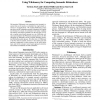Free Online Productivity Tools
i2Speak
i2Symbol
i2OCR
iTex2Img
iWeb2Print
iWeb2Shot
i2Type
iPdf2Split
iPdf2Merge
i2Bopomofo
i2Arabic
i2Style
i2Image
i2PDF
iLatex2Rtf
Sci2ools
102
click to vote
AAAI
2008
2008
Using Wiktionary for Computing Semantic Relatedness
We introduce Wiktionary as an emerging lexical semantic resource that can be used as a substitute for expert-made resources in AI applications. We evaluate Wiktionary on the pervasive task of computing semantic relatedness for English and German by means of correlation with human rankings and solving word choice problems. For the first time, we apply a concept vector based measure to a set of different concept representations like Wiktionary pseudo glosses, the first paragraph of Wikipedia articles, English WordNet glosses, and GermaNet pseudo glosses. We show that: (i) Wiktionary is the best lexical semantic resource in the ranking task and performs comparably to other resources in the word choice task, and (ii) the concept vector based approach yields the best results on all datasets in both evaluations.
Related Content
| Added | 02 Oct 2010 |
| Updated | 02 Oct 2010 |
| Type | Conference |
| Year | 2008 |
| Where | AAAI |
| Authors | Torsten Zesch, Christof Müller, Iryna Gurevych |
Comments (0)

